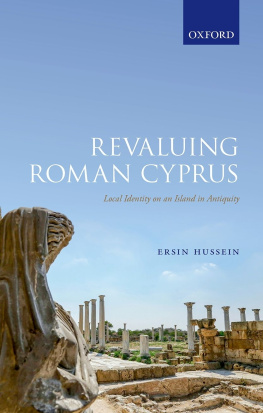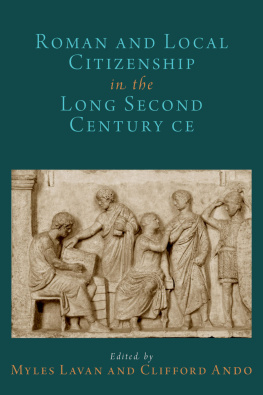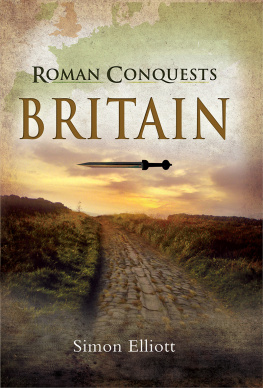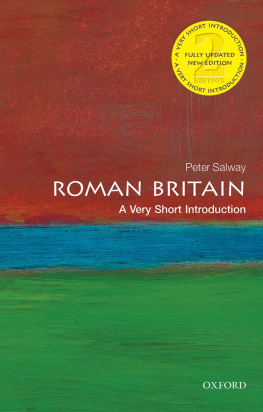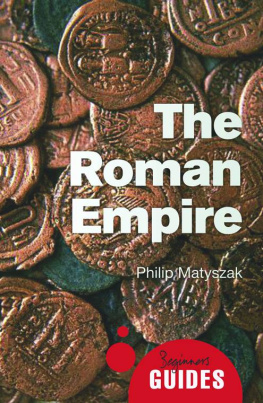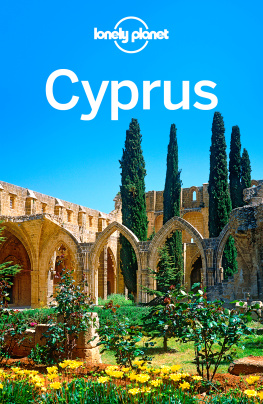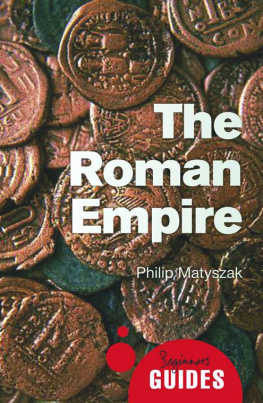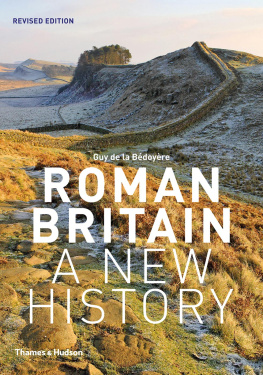Revaluing Roman Cyprus

Great Clarendon Street, Oxford, OX2 6DP, United Kingdom
Oxford University Press is a department of the University of Oxford. It furthers the Universitys objective of excellence in research, scholarship, and education by publishing worldwide. Oxford is a registered trade mark of Oxford University Press in the UK and in certain other countries
Ersin Hussein 2021
The moral rights of the author have been asserted
First Edition published in 2021
Impression: 1
All rights reserved. No part of this publication may be reproduced, stored in a retrieval system, or transmitted, in any form or by any means, without the prior permission in writing of Oxford University Press, or as expressly permitted by law, by licence or under terms agreed with the appropriate reprographics rights organization. Enquiries concerning reproduction outside the scope of the above should be sent to the Rights Department, Oxford University Press, at the address above
You must not circulate this work in any other form and you must impose this same condition on any acquirer
Published in the United States of America by Oxford University Press
198 Madison Avenue, New York, NY 10016, United States of America
British Library Cataloguing in Publication Data
Data available
Library of Congress Control Number: 2020952847
ISBN 9780198777786
ebook ISBN 9780191083365
DOI: 10.1093/oso/9780198777786.001.0001
Printed and bound by
CPI Group (UK) Ltd, Croydon, CR0 4YY
Links to third party websites are provided by Oxford in good faith and for information only. Oxford disclaims any responsibility for the materials contained in any third party website referenced in this work.
Acknowledgements
The expected privileges and challenges of research are amplified when engaging with an historically and socially complex landscape such as Cyprus. Study of its landscape and history requires open-mindedness, a readiness to partake in flexible and creative thinking in the face of obstacles, buckets of good humour, and above all collaboration. For these reasons, and more, there are many people to thank when reflecting upon the development of this book.
It is only right that I begin by thanking members of staff from the Department of Classics and Ancient History at Warwick who guided and supported me throughout my PhD studies, where this project began under the supervision of Alison Cooley. The guidance and mentoring that I received (i.e. the steady, calm, and professional Cool(ey) under firesorry Alison!approach to research, teaching, and academic life in general) has stood me in good stead since and remains a crucial point of reference when navigating all that working in academia presents. During this time I was also fortunate enough to consult materials and discuss ancient Cyprus with a number of people based at other academic institutions, and this helped shape my research considerably. My gratitude goes to all of the staff based at the Cyprus American Archaeological Research Institute in Cyprus who, in 2011, hosted me during one of many research trips to the island. This institute is the lifeblood of research on ancient Cyprus and plays a crucial role in bringing together communities across the island and the world to share ideasit is uplifting for so many reasons to see this continue in action and be part of it. Thanks also to Klaus Hallof and Daniella Summa for their hospitality when I visited the Berlin-Brandenburgische Akademie der Wissenschaften in 2011 and 2012. Both offered invaluable advice and shared with me their work on the Inscriptiones Graecae XV project, the long-awaited edition that will collate the inscriptions from ancient Cyprusan incredible and valuable resource for future researchers of the islands history. Whilst in Berlin, I was also granted access to the holdings of their archives and to the praecorpus of inscriptions. I would also like to thank Susanne Turner and her team for facilitating my study of the Terence Bruce Mitford squeeze collection, as well as his personal notes, at the Museum of Classical Archaeology at the University of Cambridge. Special thanks also go to Takashi Fujii, who took the time to discuss Roman Cyprus with me on many occasions, and to David Potter, who made his 2000 study Roman Cyprus available to me. Gabriel Bodard and Thomas Kiely also offered advice and insights into the collection of defixiones from Amathoussome of which are held at the British Museum. Thomass generosity and energies in supporting and promoting the study of ancient Cyprus cannot be praised enough. It is through him that I met, and made friends with, my long-standing collaboratorthe artist Yorgos Petrou. Working with Yorgos over the past five years or so has not only enriched my appreciation and understanding of ancient Cyprus and my research in general but has had a positive impact on my teaching too. Long may this continue! I do not underestimate the importance of the many connections I have made with researchers who focus on ancient Cyprus and its reception at conferences over the years either. Feedback in response to papers and general discussion about the rewards of exploring Cypruss history and landscape have inspired and refined many aspects of my research. With these exchanges over coffee and email in mind, I greatly thank Achilleas Hadjikyriacou, Giorgos Papantoniou, Alicia Chrysostomou, Anna Reeve, and Michael Given.
The anonymous peer reviewers, who read the manuscript at key stages, were pivotal in the development of the present monograph. Their comments helped it shed the usual hallmarks of PhD study, and I hope that my responses to their reports do the study of Roman Cyprus justice. I am grateful also to Alex Swanston, from The Map Archive, for developing the images for this study and for the editorial team at Oxford University Press for their expertise and patience.
I am ever indebted to my Swansea family, members of the Department of Classics, Ancient History, and Egyptology at Swansea University, where I am now based. I cannot thank Ian Goh, Meg Gundlach, Ken Griffin, Mark Humphries, Maria Pretzler, Janja Soldo, and Nigel Pollard enough for their advice, much-needed words of encouragement, and eagerness to support in whatever way possibleespecially during the final stages of preparing the manuscript, when we were all in the throes of dealing with the Covid-19 pandemic, access to key research resources was limited, and when shielding was a personal necessity.
Special mention also goes to the students who have enrolled on my module Ancient Cyprus at Swansea. Designing, and revising, this short course has made clear the many challenges that keen undergraduate students face when wishing to investigate ancient Cyprus, particularly the islands Hellenistic and Roman periods. Our joint experiences of overcoming these issues have influenced many aspects of this book. It is my hope that this work remedies the barriers in some part and in doing so promotes the study of Roman Cyprus at undergraduate level.
It is here that I must stress that any errors in, or limitations of, this work are my responsibility alone.
Lastly, and certainly not least, my greatest thanks go to my family, particularly to my mother and my husband. They both have truly endured every high and low of this project and without their patience, unwavering support, and encouragement over the past ten years so much would have been impossible. This book is dedicated to them and to my son, who was born sometime in between me submitting the revised manuscript to the editors and receiving the copy edits.

